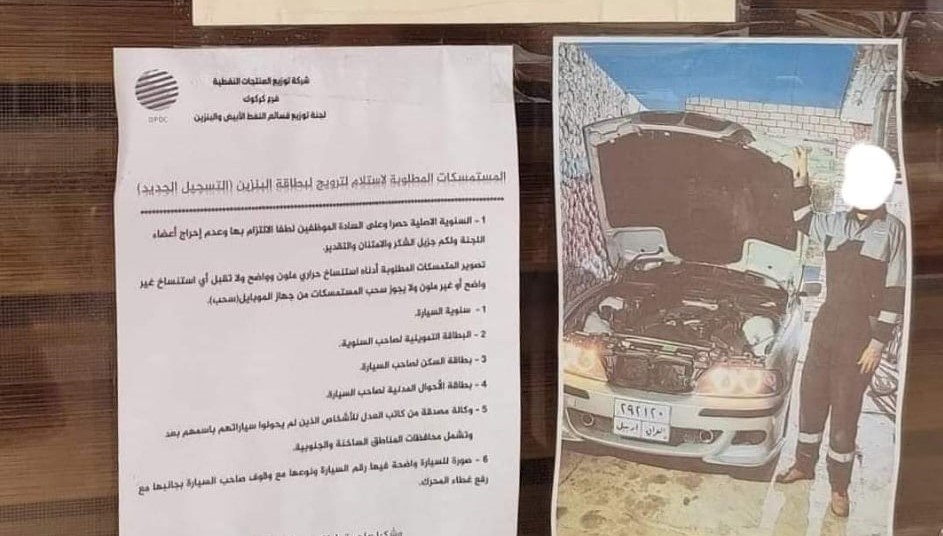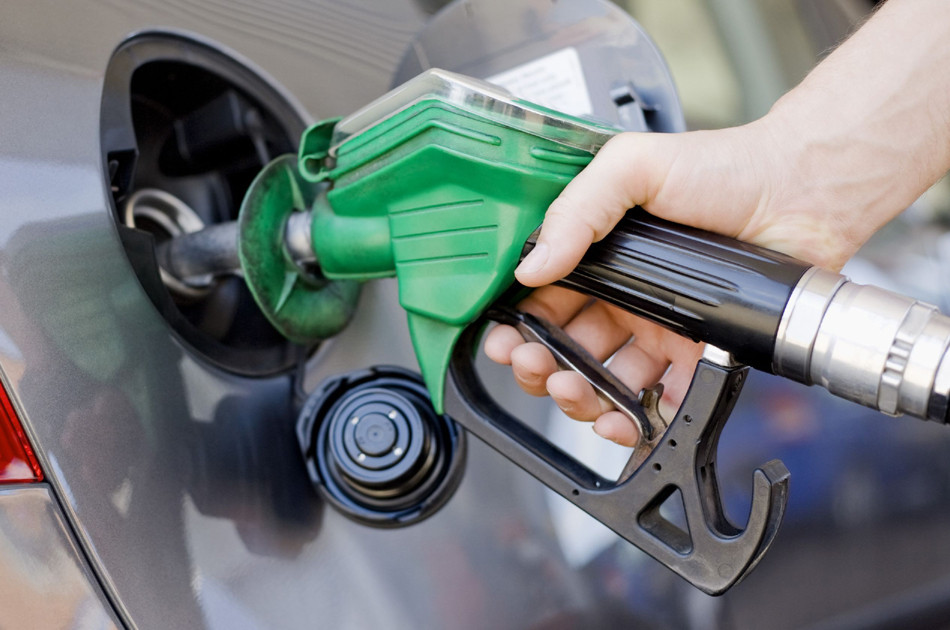To issue coupons for weekly portion in state-run petrol stations, motorists in Kirkuk are required to raise the front hood of their vehicles and take a picture next to it, under the pretext of preventing counterfeiting.
According to the new instructions of the state-run Oil Products Distribution Company, there have been changes in the instructions and documents related to the issuance of petrol coupons, some of which have exasperated the motorists.
“They should have thought of other ways, not to ask us to raise the hood of the car and take a picture next to it,” Akram Kamal, a Kirkuk driver, told KirkukNow.
Issuing a petrol filling card, in addition to taking a picture of the vehicle owner, requires the vehicle’s registration card, food ration card, civil status card or national card, and if the vehicle is not registered in the name of its driver, he must bring an agency from the original vehicle owner.
Subsidized fuel policy is followed since many years in Iraq which had a central state-run policy in all sectors up to 2003, when Saddam Hussein was ousted, per which the Iraqi government through the public sector was providing all services.
In Iraqi Kurdistan region, most of petrol stations are private where gasoline costs double compared to state-run petrol stations all over Iraq excluding the Kurdish region which receives small quantities from Baghdad and the rest is imported.
The cost which is soaring up day after day due to oil prices in global markets has pushed motorists in Kurdish towns adjacent to the disputed territories to fill tanks of their vehicles, a matter pushed Iraqi officials to limit their subsidization for this sector in those areas.

The new list of documents and instructions for issuing fuel cards in Kirkuk requires original documents of owner, vehicle and photo of both together.
An informed source in the Kirkuk branch of the Oil Products Distribution Company, anonymously told KirkukNow obligating the driver to take a picture next to his vehicle is used as evidence that he is the true owner of the vehicle “as a proof that he didn't take the photo next to someone else's vehicle, but rather his own because he managed to open the hood."
This measure comes at a time when the administration of Kirkuk province few weeks ago have decided to deploy Iraqi army forces in front of government petrol stations to prevent drivers who buy petrol coupons from the black market.
The source added that the aim of the new instructions is to limit the issuance of top-up cards through counterfeiting, and to prevent drivers from issuing more than one card by manipulating the number and type of vehicle plate numbers.
“It turned out that there were dozens of cases in which the driver tampered with the model and number of the car plate, so issuing a petrol filling card now requires the driver to take a picture of him next to his vehicle,” the source from the Oil Products Distribution Company indicated.
Previously, some motorists used to buy petrol coupons from the black market in order to fill their vehicles at government stations at subsidized prices.
Some of the Kurdistan Region drivers used to go to some districts and districts that are supplied with fuel by the Iraqi government in order to fill up their vehicles, given that the price is lower compared to the governorates of the Kurdistan Region, where the price of one liter of ordinary gasoline is 850 Iraqi dinars (1,480 IQD= 1 USD).
In addition to tightening the procedures for issuing petrol coupons, the Iraqi government raised the prices of gasoline in several areas adjacent to the Kurdistan Region in four Iraqi governorates from 450 dinars to 650 dinars.
Kirkuk, November 2021- Iraqi army patrols were deploy at state-run petrol stations to ban smuggling.
Akram Kamal believes that it was possible to resort to specialists in technology in order to prevent forgery, and not by taking a picture of the driver next to his vehicle, "Petrol coupons contain barcodes that are recognized electronically, a valid procedure to deter counterfeiting."
Kirkuk administration distributes, through 22 governmental gas stations, 40 liters of gasoline per week for private vehicles and 80 liters for taxi vehicles, through coupons at a price of 450 dinars per liter.
Iraq holds the second-largest oil reserves following Saudi Arabia but years of conflict and sanctions have left its refineries in dire straits, with the country now relying heavily on imports of oil products despite daily export of over three million barrels of crude oil per day.
The northern oil-rich city of Kirkuk, located 238 kilometers north of Baghdad, is an ethnically mixed province for 1.7 million Kurds, Sunni and Shiite Arabs, and Turkmen. It has long been at the center of disputed territories between Baghdad and Erbil.
Currently, Iraqi army, local and federal police, Special Forces along with Shiite paramilitary of Popular Mobilization Forces PMF, undertake the security of Kirkuk province and the disputed territories.





